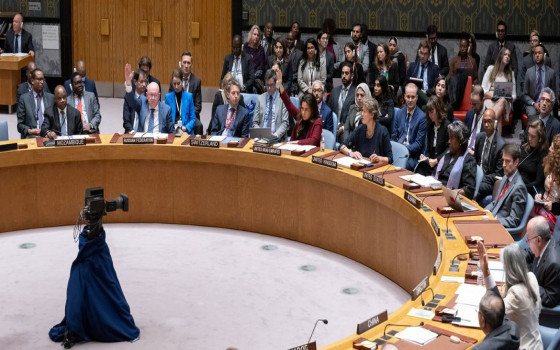
Following the UN Security Council resolution on the situation in Gaza, international reactions varied. European media focused on the increasing number of Palestinian deaths in Israeli prisons and settler attacks.

- Europe and Arabs
- Tuesday , 18 November 2025 11:46 AM GMT
Gaza: Europe and the Arab World
Reactions to the US-backed UN resolution on deploying an "international stabilization force" in Gaza have varied. The Palestinian Authority welcomed the news, stressing the need for the resolution to be implemented "as quickly as possible." Indonesia also supported the resolution, emphasizing the importance of "involving all parties, especially the Palestinian Authority."
US President Donald Trump, who considers the deployment of a stabilization force part of his 20-point plan for the reconstruction of Gaza, described the resolution as "one of the greatest decisions ever made by the United Nations." According to Trump, it is a step closer to "peace everywhere in the world." A report published by the Dutch newspaper Luxkrant stated that 13 countries voted in favor of the resolution, while Russia and China abstained. The Russian ambassador to the UN, Vasily Nebenzya, stated that the resolution lacked "important elements." For example, it was unclear when Gaza would have an independent government. His Chinese counterpart, Fu Cong, shared these concerns, arguing that the plan did not adequately address Palestinian interests. According to a report by the European news network Euronews in Brussels, the UN Security Council adopted the US proposal on Monday, which outlines the second phase of a ceasefire agreement in Gaza, despite divisions surrounding it. All members voted in favor except for Russia and China, but they did not use their veto power, which would have blocked the resolution. The resolution thus granted international legitimacy to President Donald Trump's 20-point plan for Gaza, which the Republican leader praised in a lengthy social media post, writing: "Congratulations to the world on the incredible vote." At the Security Council moments ago, which recognizes and endorses the Peace Council that I will chair, and which will include the most powerful and respected leaders in the world.” The “Peace Council” is the transitional authority that will administer the Gaza Strip for a renewable two-year period. Former British Prime Minister Tony Blair’s name had been floated to lead it, although his candidacy faced strong opposition due to his association with the Iraq War. The council will be supported by the International Stabilization Force (ISF), which will include troops from several countries, likely including Indonesia and Azerbaijan, as well as Palestinian police officers being trained by Egypt. Trump confirmed that the names of the council members, along with “other exciting announcements,” will be revealed in the coming weeks. The resolution stipulates that the Peace Council will oversee the disarmament of Hamas and other factions—a key Israeli demand—as well as the reconstruction of Gaza. It also includes a notable reference to the possibility of a Palestinian state, without specifying a timeframe. In a related article, the Dutch newspaper Volkskrant, under the headline “Netanyahu vows action against extremist settlers in the West Bank,” added, “He condemned Israeli Prime Minister Benjamin Netanyahu condemned the actions of "a handful of extremists" among Jewish settlers in the West Bank. He said he would personally deal with the issue of violent settlers. Netanyahu made his statement following a settler attack on the Palestinian village of Jaba'. "I take these violent attacks very seriously," he said, adding that these settlers want to take matters into their own hands. The attack on Jaba' came in response to the Israeli army's evacuation of settlements in Gush Etzion, south of Jerusalem.
Shortly before that, the Israeli army intervened when dozens of Israelis destroyed Palestinian homes and cars.
The attack came in response to the Israeli army's evacuation of settlements in Gush Etzion, south of Jerusalem. Under the headline "Nearly 100 Palestinians have died in Israeli prisons since October 7, 2023," the Dutch newspaper reported, "Nearly 100 Palestinians have died in Israeli prisons in the past two years. In many cases, their deaths are attributed to the systematic violence and lack of healthcare to which Palestinian prisoners are subjected in Israel." This is according to a report published today by Physicians for Human Rights-Israel (PHRI).
The number of deaths has risen sharply since the Hamas offensive on October 7, 2023. According to PHRI, 30 Palestinians died in Israeli prisons in the 10 years preceding the war on Gaza. In the past two years, the organization has documented a total of 98 deaths. The prison population has more than doubled in the past two years, reaching approximately 11,000. These figures include Palestinians from the Gaza Strip and the West Bank. The Associated Press corroborated the report's findings, based on interviews with former prisoners, Israeli eyewitnesses, and lawyers. A former Israeli prison guard told the Associated Press that Palestinians are regularly beaten and kicked. The Sde Teiman prison, where he worked, was reportedly nicknamed "the graveyard" because of the high number of prisoner deaths.












No Comments Found